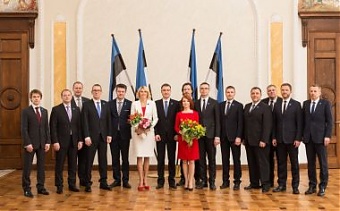Analytics, Estonia, EU – Baltic States, Financial Services, Legislation, Markets and Companies, Taxation
International Internet Magazine. Baltic States news & analytics
Saturday, 27.04.2024, 06:57
Estonian government approves of 100-day action plan
 Print version
Print version |
|---|
The action plan establishes the priority objectives and tasks of the government, the responsible ministers, deadlines and the level of decision-making.
To strengthen the security of Estonia, the government will keep military defence expenditure at least at two percent of the GDP. The presence of NATO in Estonia and NATO’s visible deterrence in Estonia and neighbouring regions will be continued, additionally financing the activities of Estonia as the host country for creating conditions for the continued presence of allies. An infrastructure will be developed for receiving the units of allies.
Another objective of the 100-day plan is the continued cleaning of the Eastern border, the final outcome of which is fully constructing the border by Estonia’s 100th anniversary.
In order to achieve economic growth, the new government wishes to reduce labour taxation by increasing the taxation of goods more harmful to health and the environment.
To decrease social tax by one percent from 33 percent to 32 percent, a draft for amending the Social Tax Act and other acts will be initiated.
For increasing the tax-free income from 154 euros to 205 euros per month, a draft for amending the Income Tax Act will be initiated.
Draft acts for amending the Investment Funds Act and the Securities Market Act will also be prepared for simplifying investment rules and supporting the development of the domestic capital market as well as for enabling Estonian pension and investment funds to invest into the Estonian economy at a larger scale compared to the current one.
For encouraging export and investments, the government plans to create a global ESTONIA-network, comprising of Estonian foreign missions, honorary consuls-business ambassadors, compatriots living and working abroad, Estonia’s friends and their associations. For this purpose, the concept of creating a network will be developed.
To ensure that economic growth reaches each person and the coping of people increases, an annual repayment system will be created for people with low income. During the first 100 days, the draft repayment act with effect from 1 January will be developed.
The state budget strategy foresees supporting families in need by increasing the subsistence benefit rate to 130 euros. The increase is the largest subsistence benefit rate increase in the last decade.
To improve the coping of families with children and creating an environment, which supports having children, child allowances will be increased. By amending the State Family Benefits Act, the child allowance for the first and second child will be increased to 60 euros. Families raising three and more children will receive an additional large families benefit of 200 euros.
The government is also preparing the supporting of the creation of nursery school places in the form of a state investment to local governments and will increase the housing benefits programme for large families.
As one step in the process of better organising the state, reforming local administration and alleviating peripheralisation, the political coordinating of the administrative reform will be led by the prime minister. A coordinating forum will be created for managing the administrative reform.
To increase the effectiveness of governing, suggestions for joining support services will be developed. An analysis will be carried out helping to decrease duplication and bureaucracy between ministries and public authorities with the objective of decreasing the number of positions and authorities.
On 17 July 2015, the first 100 days will have passed from the formation of the new government.








 «The Baltic Course» Is Sold and Stays in Business!
«The Baltic Course» Is Sold and Stays in Business!

